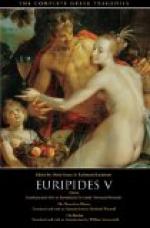Title: The Electra of Euripides
Author: Euripides
Release Date: December 10, 2004 [EBook #14322]
Language: English
Character set encoding: ASCII
*** Start of this project gutenberg EBOOK the Electra of Euripides ***
Produced by Paul Murray, Charles Bidwell and the PG
Online Distributed
Proofreading Team.
THE
ELECTRA
OF
EURIPIDES
TRANSLATED INTO ENGLISH RHYMING VERSE WITH EXPLANATORY NOTES BY
Gilbert Murray, ll.D., D.Litt.
REGIUS PROFESSOR OF GREEK IN THE UNIVERSITY OF OXFORD
FORTY-SECOND THOUSAND
LONDON: GEORGE ALLEN & UNWIN LTD RUSKIN HOUSE, 40 MUSEUM STREET, W.C.1
First Edition, November 1905
Reprinted, November 1906
" February 1908
" March 1910
" December 1910
" February 1913
" April 1914
" June 1916
" November 1919
" April 1921
" January 1923
" May 1925
" August 1927
" January 1929
(All rights reserved)
PERFORMED AT
THE COURT THEATRE, LONDON
IN 1907
Printed in Great Britain by Unwin Brothers Ltd., Woking
Introduction[1]
The Electra of Euripides has the distinction of being, perhaps, the best abused, and, one might add, not the best understood, of ancient tragedies. “A singular monument of poetical, or rather unpoetical perversity;” “the very worst of all his pieces;” are, for instance, the phrases applied to it by Schlegel. Considering that he judged it by the standards of conventional classicism, he could scarcely have arrived at any different conclusion. For it is essentially, and perhaps consciously, a protest against those standards. So, indeed, is the tragedy of The Trojan Women; but on very different lines. The Electra has none of the imaginative splendour, the vastness, the intense poetry, of that wonderful work. It is a close-knit, powerful, well-constructed play, as realistic as the tragic conventions will allow, intellectual and rebellious. Its psychology reminds one of Browning, or even of Ibsen.
To a fifth-century Greek all history came in the form of legend; and no less than three extant tragedies, Aeschylus’ Libation-Bearers (456 B.C.), Euripides’ Electra (413 B.C.), and Sophocles’ Electra (date unknown: but perhaps the latest of the three) are based on the particular piece of legend or history now before us. It narrates how the son and daughter of the murdered king, Agamemnon, slew, in due course of revenge, and by Apollo’s express command, their guilty mother and her paramour.




